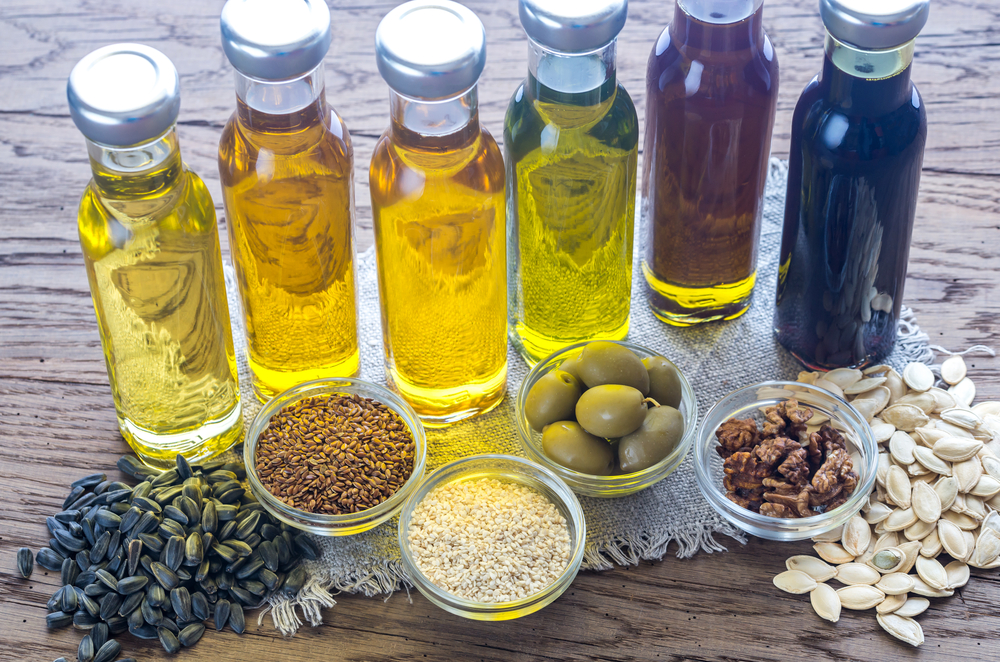
Plant oils
Vegetable-derived oils are extracted from vegetable organisms and they are composed almost by a total of lipids, such as fats.
The typologies or vegetable oils are several:
- Fruit oils: like olive oil, palm oil, coconut oil, avocado oil;
- Seeds oils: peanut, rape, sunflower, palm, sesame, soy, grapefruit, wheat, corn and rice
All the vegetable oils are sensitive to light, air and warm. They are obtained generally through a squeezing, and the cold one is advised for a better quality of the final product.
The typical vegetable oil of the Mediterranean is the olive oil, and Italy is one of the most important producers world-wide.
Puglia (Italian region) has the higher number of olive farms, followed by Sicilia, Calabria, and Campania. In the production of 2019/2020, the global production of oil has been of about 3.207.000 tonnes, decreasing of the 1,7% compared to the previous season. At first place there is Spain, with an annual production of 9.176.929 tonnes, followed by Italy (1.945.324 tonnes), Turkey (1.674.377 tonnes), Greece (1.525.543 tonnes) and Maroc (1.479.853 tonnes).
In the case of olive oil, the production phases are:
- Harvest: takes place when the olive arrives at the right maturation point, in different modalities. Harvest by hand, and is the one that guarantees the best quality. At high heights is done by a raking, with a dedicated support. Then there is the mechanical harvest, which is done with machines which stress the tree in such a way as to cause the olives to fall on large nets placed under the crown, preferably raised from the ground in order to avoid contact with the soil. In this phase it is fundamental to be careful not to break or contaminate the fruit.
- Transport: it must be in a very safe way, and very quick. The destination is the oil mill. The ideal time to transport the olives is about 24/48 hours, to preserve the characteristic of the olives, avoiding the break that could be a contamination reason.
- Stockage: The quicker this phase is the better is the quality of the obtained oil. It takes place in an olive grove, an airy and fresh place. The stockage takes place in heaps of olives not higher than 15-20 cm, to be turned and to be aired periodically. It is absolutely to be avoid the stockage in closed bags.
- Defoliation: to release the olives harvested from other material, such as leaves and branches.
- Crushing and kneading: in the first case it is intended literally the breaking of the olives so that it is possible to obtain a smashed compound that can be then squeezed. Afterwards, this compound is placed into malaxers to be mixed slowly. The purpose is to break the water-oil emulsion that were been formed during the crushing, so that the little amounts of oil can be re-unified to other in order to become bigger and easily separable.
- Extraction: this is the phase that leads to the final separation of the three components of olive paste, olive pomace, oil and vegetation water. It can take place according to different methods, the main ones are through mechanical pressure, centrifugation and percolation, separation.
- Filtration: here the last parcels of the fruit and the suspended mucilages, which make the oil still turbid, are removed. This can be obtained by sedimentation and filtration.
- Conservation and stockage: oil must be conserved with no light, no warm, and not in airy places. Because these are all factors that might damage it.
Process and Product Innovation
The shift to the Industry 4.0 is a moment of deep change and innovation capable to disrupt all the sectors.
The industry 4.0 is considered as a new Industrial Revolution that appears to be even more disruptive of the previous ones. It is seen as such because it is born from the convergence of the IT and OT technologies to create a digit...
Supply chains involved:
Dairy Products Milk Plant oilsSupply chains involved:
Plant-based Beverages Coffee Cereals Chocolate Canned Foods Beer Dairy Products Nuts Food Supplements and Nutraceuticals Milk Plant oils Fruit and Vegetables Pasta Meat Baking products Sweet products Rice Cold Cuts and Cured Meats WinerySupply chains involved:
Milk Plant oils